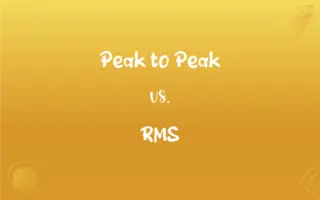Lethargic vs. Somnolent: What's the Difference?
By Aimie Carlson & Janet White || Updated on May 23, 2024
Lethargic describes a state of sluggishness and lack of energy, while somnolent refers to a feeling of drowsiness or sleepiness.

Key Differences
Lethargic describes a state of sluggishness or a lack of energy and enthusiasm. It is often used to depict someone who is inactive, slow, or indifferent due to fatigue, illness, or boredom. For example, "The hot weather made everyone feel lethargic." Somnolent, on the other hand, refers specifically to a state of drowsiness or a strong inclination to sleep. It describes a person who is sleepy or almost asleep, often as a result of being tired, medication, or a relaxing environment. For instance, "The somnolent effect of the medication made it hard for her to stay awake."
Lethargic can imply a broader sense of inactivity and a general lack of physical or mental energy, which might not necessarily be linked to the need for sleep. Somnolent is more directly associated with the immediate desire or tendency to sleep, indicating a near-sleep state.
People who are lethargic may struggle with motivation and appear unresponsive or listless. In contrast, somnolent individuals primarily exhibit signs of sleepiness, such as drooping eyelids or frequent yawning.
Lethargy can be caused by various factors such as poor diet, chronic illness, or lack of exercise, affecting overall energy levels. Somnolence, however, is typically a direct response to factors like insufficient sleep, sedative medications, or a comfortable setting conducive to sleep.
Comparison Chart
Definition
Sluggish, lacking energy
Drowsy, inclined to sleep
ADVERTISEMENT
State
Inactivity, indifference
Near-sleep, sleepiness
Associated Signs
Lack of motivation, listlessness
Drooping eyelids, yawning
Causes
Fatigue, illness, boredom
Insufficient sleep, medications
Context
General inactivity
Immediate need to sleep
Lethargic and Somnolent Definitions
Lethargic
Lacking energy or enthusiasm.
After the long hike, he felt lethargic and just wanted to rest.
ADVERTISEMENT
Somnolent
Drowsy and inclined to sleep.
The warm, cozy room made everyone feel somnolent.
Lethargic
Slow and sluggish in movement or response.
The heat made the students lethargic during the afternoon class.
Somnolent
Sleepy, ready to fall asleep.
The long flight left her feeling somnolent and disoriented.
Lethargic
Indifferent and apathetic.
She became lethargic after weeks of monotonous work.
Somnolent
Inducing sleep.
The somnolent background music in the café made it hard to stay alert.
Lethargic
Displaying a lack of motivation.
The patient felt lethargic due to the side effects of the medication.
Somnolent
On the verge of sleep.
He was somnolent after taking the cold medicine.
Lethargic
Exhibiting little interest in activities.
His lethargic attitude towards exercise concerned his doctor.
Somnolent
Causing or suggesting drowsiness.
The somnolent effect of the lecture put several students to sleep.
Lethargic
Of, causing, or characterized by lethargy.
Somnolent
Drowsy; sleepy.
Lethargic
Sluggish, slow
Somnolent
Inducing or tending to induce sleep; soporific.
Lethargic
Indifferent, apathetic
Somnolent
Drowsy or sleepy.
Lethargic
Pertaining to, affected with, or resembling, lethargy; morbidly drowsy; dull; heavy.
Somnolent
(dated) Causing literal or figurative sleepiness.
Lethargic
Deficient in alertness or activity;
Bullfrogs became lethargic with the first cold nights
Somnolent
Sleepy; drowsy; inclined to sleep.
He had no eye for such phenomena, because he had a somnolent want of interest in them.
Somnolent
Inclined to or marked by drowsiness;
Slumberous (or slumbrous) eyes
`slumbery' is archaic
The sound had a a somnolent effect
FAQs
What does "somnolent" mean?
Somnolent means drowsy or inclined to sleep.
Can medication cause somnolence?
Yes, many medications can induce somnolence as a side effect.
What does "lethargic" mean?
Lethargic means sluggish and lacking energy.
Can lethargy be a symptom of illness?
Yes, lethargy can be caused by various illnesses.
What are common signs of somnolence?
Common signs include drooping eyelids, frequent yawning, and an inclination to sleep.
Is somnolence always related to nighttime sleep?
No, somnolence can occur at any time of day.
Can lethargy be caused by poor diet?
Yes, a poor diet can contribute to feelings of lethargy.
Is somnolence a medical condition?
Somnolence can be a symptom of medical conditions or side effects of medications.
Can exercise help reduce lethargy?
Yes, regular exercise can help improve energy levels and reduce lethargy.
Is somnolence the same as being tired?
Somnolence specifically refers to a state of drowsiness or sleepiness.
Can somnolence be temporary?
Yes, somnolence is often a temporary state induced by factors like lack of sleep.
What are common signs of lethargy?
Common signs include sluggishness, lack of motivation, and listlessness.
Is lethargy related to mental health?
Lethargy can be associated with mental health issues like depression.
Is somnolence typically short-term?
Somnolence is often short-term but can be persistent depending on the cause.
Does lethargy imply a need for sleep?
Not necessarily; lethargy implies general inactivity and lack of energy.
Can weather affect lethargy?
Yes, extreme weather conditions like heat can make people feel lethargic.
Does somnolence require medical attention?
Persistent somnolence may require medical attention to identify underlying causes.
Can stress cause lethargy?
Yes, chronic stress can lead to lethargy.
Can a comfortable environment cause somnolence?
Yes, a relaxing environment can induce somnolence.
Can hydration levels affect lethargy?
Yes, dehydration can contribute to feelings of lethargy.
About Author
Written by
Aimie CarlsonAimie Carlson, holding a master's degree in English literature, is a fervent English language enthusiast. She lends her writing talents to Difference Wiki, a prominent website that specializes in comparisons, offering readers insightful analyses that both captivate and inform.
Co-written by
Janet WhiteJanet White has been an esteemed writer and blogger for Difference Wiki. Holding a Master's degree in Science and Medical Journalism from the prestigious Boston University, she has consistently demonstrated her expertise and passion for her field. When she's not immersed in her work, Janet relishes her time exercising, delving into a good book, and cherishing moments with friends and family.








































































